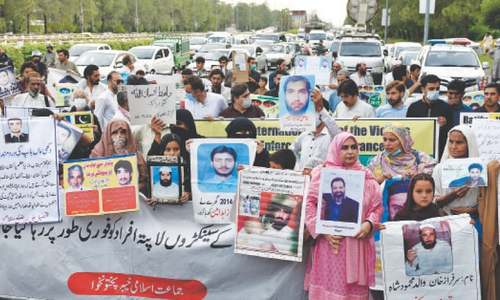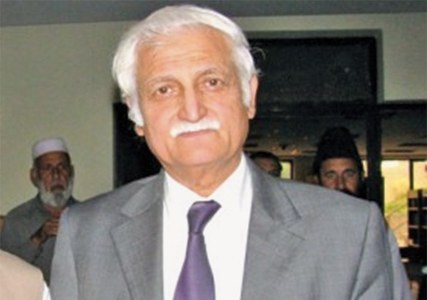Following continuous campaigning by international and national human rights organisations, the National Assembly on Nov 8 passed a bill for criminalizing practice of “enforced disappearance”.
The bill — Criminal Law (Amendment) Bill 2021-- is aimed at making amendments in the Pakistan Penal Code (PPC) and Code of Criminal Procedure (CrPC) and will now be sent to the Senate for its passage.
Enactment of a law for criminalising “enforced disappearance” is a long-standing demand of human rights bodies specially Amnesty International and Human Rights Commission of Pakistan.
While the government has been terming the proposed amendments to be very effective, legal experts and relatives of “missing persons” are attaching less hope to it.
The bill was introduced in the National Assembly by the ministry of interior in June 2021. While initially there was no provision related to filing of a false complaint or information about subjecting a person to enforced disappearance, subsequently a provision was added to the bill for declaring it a penal offence punishable up to five years imprisonment with fine up to Rs500,000.
The proposed law provides for insertion of a new section “52B” in the PPC providing for definition of “enforced disappearance”.
It states: “The term enforced disappearance relates to illegal and without lawful authority arrest, detention, abduction or any other form of deprivation of liberty by an agent of the State or by person or group of persons acting with the authorisation, support or acquiescence of the Stat, followed by a refusal to acknowledge the deprivation of liberty or by concealment of the fate or whereabouts of the disappeared person, which place such a person outside the protection of the law.”
Explanation to the said section provides for presence of three elements for classifying an act as an enforced disappearance.
These elements include: an unlawful or illegal deprivation of liberty, or a deprivation of liberty that was legal but no longer is; an act allegedly carried out by agents of the State or by person or group of persons acting with the support, authorization or acquiescence of the State; and, refusal to acknowledge the deprivation of liberty or concealment of the fate or whereabouts of the disappeared person.
The bill also provides for insertion of a new section 513 and 514 in the PPC. Section 513 provides for punishment for an act of enforced disappearance including prison term up to 10 years with fine. Similarly, section 514 provides for punishment for filing false complaint.
Under the proposed law the offence of “enforced disappearance” will be cognizable and not compoundable. However, nothing was mentioned about the offence of “false complaint” whether that will be cognizable and compoundable or not.
Presently, in Pakistan there is no law which defines “enforced disappearance”.
In scores of cases the concerned police stations were directed to register FIRs by the superior courts or by the Commission of Inquiry on Enforced Disappearances (CIED) and they had registered cases mostly under section 365 of the PPC dealing with kidnapping or abduction.
“My son was taken into custody in 2009 in Peshawar and since then he has been missing. An FIR was registered at Paharipura police station but without any outcome,” said Khan Said, father of Noor Said, belonging to Hangu. He said that since 2009 he has been shuttling between courts and CIED but in vain.
He told Dawn that some former “missing persons” who were subsequently set free had spotted his son in certain detention centres, but they were reluctant to testify the same before a court or the commission and thus it was difficult to prove it.
Legal experts dealing with such like cases believe that in the existing situation in the country the civilian law enforcing agencies including police are not in a position to prosecute the agencies or forces allegedly involved in “enforced disappearances”.
One of the lawyers said that such practices had been institutionalised and were not carried out on individual level. He said that when institutions were in a state of denial and even not ready to accept that such like practices were in vogue, how they were going to prosecute the responsible officials.
The most important international legal instrument dealing with such practices is the International Convention for the Protection of All Persons from Enforced Disappearances, which was adopted by the UN General Assembly on Dec 20, 2006. This convention entered into force on Dec 23, 2010. However, Pakistan has neither signed nor ratified it.
The definition of “enforced disappearance” in the convention is almost identical to the one provided in the Bill.
Presently, two UN bodies — The Committee on Enforced Disappearances and the Working Group on Enforced or Involuntary Disappearances (WGEID) — coexist and collaborate where possible to assist states in tackling the issue of “enforced disappearance”.
The working group had undertaken a 10-day visit to Pakistan in Sept 2012 and had also put forward several recommendations in its report. One of the important recommendations was: “A new and autonomous crime of enforced disappearance should be included in the Criminal Code, following the definition given in the 2006 Convention on the Protection of all Persons against Enforced Disappearances, and with all the legal consequences flowing from this qualification.”
Interestingly, while the government institutions continued to deny any illegal detentions on their part, there were scores of cases reported when despite their denial a detainee was later on found in their custody. IN certain cases while they had denied the detention of a detainee, he was subsequently tried and convicted by the military courts set up after the passage of the Constitution (Twenty first Amendment) Act, 2015.
Experts believe that apart from amending the law, the state institutions should also come out of the state of denial and the practice of “enforced disappearance” should not be patronised by any of the institutions.
Published in Dawn, November 15th, 2021




































